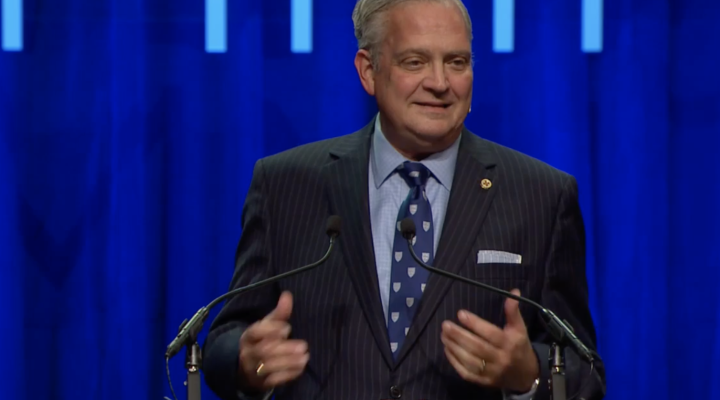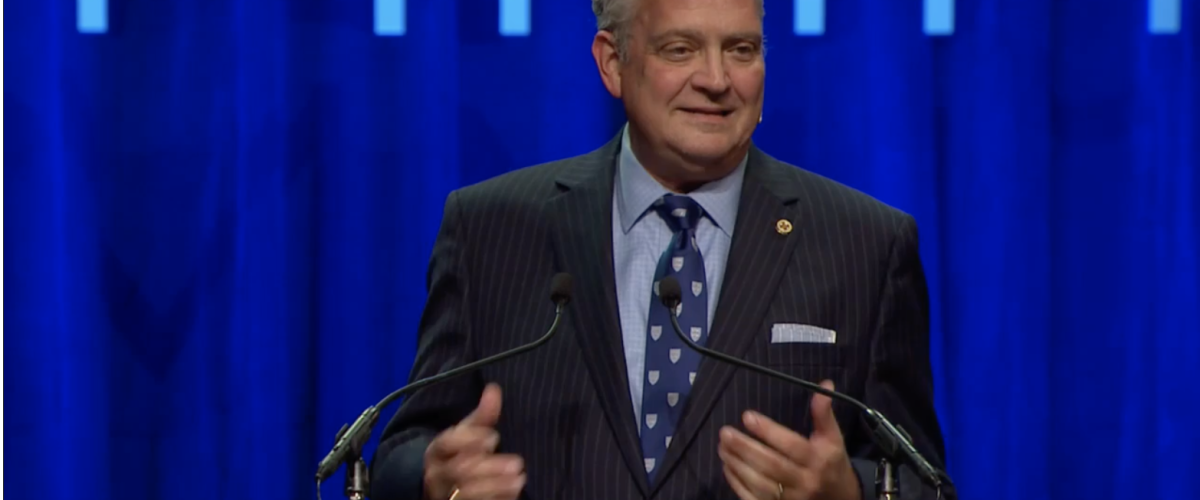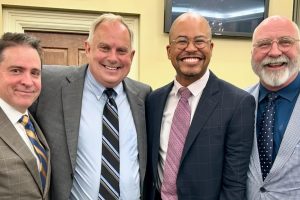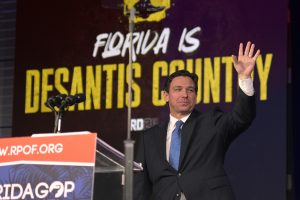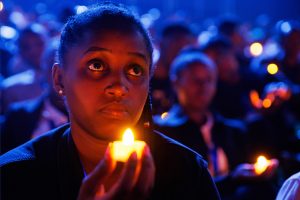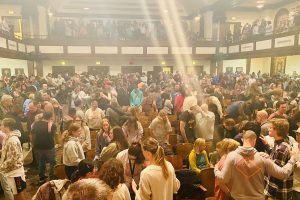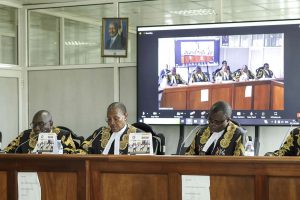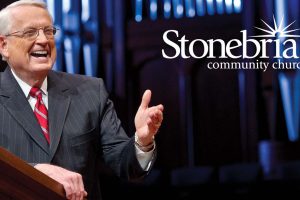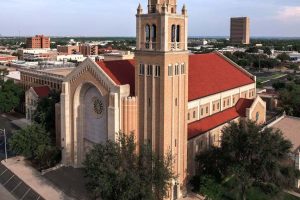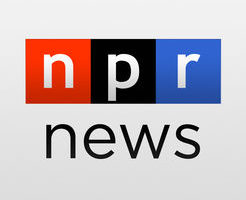Christians who fail to vote or who vote “wrongly” are “unfaithful” to God, Al Mohler told a group of conservative evangelicals Sept. 14.
The president of Southern Baptist Theological Seminary in Louisville, Ky., and a leading spokesman for Southern Baptists was one of the opening speakers for the Pray Vote Stand conference at First Baptist Church of Atlanta.
The day before, Sept. 13, Mohler was the closing speaker for another conference in Miami, the National Conservatism Conference, or NatCon for short. This event is sponsored by the Edmund Burke Foundation in partnership with an array of other politically and theologically conservative groups.
The Pray Vote Stand conference, held in Atlanta, is organized by the Family Research Council, a conservative evangelical advocacy group recently in the news because the Internal Revenue Service granted it classification as a “church,” allowing less financial scrutiny. The event was billed as a time to “equip and encourage believers as we discuss current cultural issues impacting faith, family and freedom and evaluate these through the lens of a biblical worldview.”
There, Mohler appeared amid a lineup of Family Research Council staff, Republican politicians and notable conservatives: Ben Carson, secretary of housing and urban development in the Trump administration; controversial historian David Barton; former Arkansas governor Mike Huckabee; and Florida Gov. Ron DeSantis, a likely 2024 presidential candidate.
Once a never-Trump Republican, Mohler reversed his position and boldly endorsed Donald Trump in the 2020 presidential election — despite Trump’s moral flaws, lies and cruel policies.
‘Stewardship of the vote’
“We have a responsibility to make sure Christians understand the stewardship of the vote, which means the discipleship of the vote. … They need to understand that insofar as they do not vote or they vote wrongly, they are unfaithful,” Mohler declared.
“We need the right voters showing up with the right convictions at the right time to vote the right way.”
At the conclusion of his 25-minute speech, he reiterated: “We need the right voters showing up with the right convictions at the right time to vote the right way.”
That “right way,” he indicated, is always against abortion, always against same-sex marriage, always against transgender identity, always against gay rights.
Speaking from the well-known passage of Ecclesiastes 3 — “to everything there is a season” — Mohler said Christians must always know what time it is. “We better know if it’s a time to break down or a time to build up. We better know if it’s a time of peace or a time of war.”
“We are living in really strange times,” he said, when “all kinds of people are around us telling us that we’re exaggerating the reality.” These critics are certain things are not as bad as conservative Christians think they are, he explained.
But those who are fighting the encroachment of modernity and liberalism are not overly alarmed, he said. “What’s at stake is unborn human life. What’s at stake is human dignity. … What’s at stake is the sanctity of marriage. … What’s at stake is the integrity of the family.”
He declared: “We are at a time of war.”
All about abortion
And any conservative who believes the battle is over because the U.S. Supreme Court has overturned Roe v. Wade is deceived, he said. “We’ve got 50 more years of work to do. … The big battles are still to come. As important as these battles were … every single one of them required Christians to vote right …. Every single election matters. But every single election is followed by the next one.”
“If you want to know where someone is on the big issues of life, just find out if they celebrate the reversal of Roe v. Wade.”
Following the standard conservative evangelical playbook, Mohler returned again and again to abortion as a litmus test for voting. “If you want to know where someone is on the big issues of life, just find out if they celebrate the reversal of Roe v. Wade,” he said.
The seminary president said human life begins at “the moment of fertilization” and should be respected as “the image of God on earth.”
At NatCon, a ‘battle of ideas’
The day before, Mohler was the closing speaker for NatCon, where he gave a 45-minute speech laced with history and theology and ideology. He spoke of the “great creeds of the Christian church” as unifying the church universal in times of trouble. And he lauded the event’s organizers for seeking to advance conservatism in the nation.
He spoke of a “battle of ideas” raging in America today. “It’s a very dangerous battle of ideas because so many of the ideas are inherently dangerous,” he declared.
One of “the most dangerous ideas of our age … is the very dangerous illusion of the secular state,” he said, citing materialism, fascism, pragmatism, postmodernism, critical theory and deconstructionism as examples.
In opposition to conservativism, he said, liberalism and progressivism have sought to destroy the influence of religion and render America a completely secular state.
“Protestant liberalism, especially in the first half of the 20th century, was largely driven by the argument we’ll ditch the theology and keep the morality.”
“When I teach the history of theology, one of the things I point out is that Protestant liberalism, especially in the first half of the 20th century, was largely driven by the argument we’ll ditch the theology and keep the morality. How’d that work out with the rainbow flags outside those churches? You can’t have the morality without the theology, take it from a theologian.”
‘Four friendly giants’
He compared progressive ideas to a “fairy tale” that has been leading the nation astray. And in that fairy tale, there are “four friendly giants” who appeared “to emancipate the elves,” he said, naming Nietzsche, Darwin, Freud and Marx. “They were the giants that emancipated the elves by their prophecies of modernity. Then came new marvels —technology, modern universities, contraceptive devices, pills, automobiles, no-fault divorce, social media, the list goes on.”
The idea of liberals is that modernity is “never to be resisted and only to be welcomed. Well, we understand that this is a fairy tale, but it’s the fairy tale that basically drives the progressives in this culture. They’re absolutely certain that it’s not a fairy tale, but it’s the truth. And what puzzles then, perplexes them and infuriates them is that there are people who will not go along with the fairy tale.”
“People tend to gravitate toward those who hold to the ancient truth and preach the timeless truth.”
Moreover, those liberals who follow this fairy tale “end up with churches that are evacuated of actual people,” he said, drawing upon the trope that only conservative churches are growing today. “People tend to gravitate toward those who hold to the ancient truth and preach the timeless truth.”
Part of the fairy tale is that “the state itself must be secular, no religious authority, no religious privileges, no theological truth, no acknowledgement of religious roots, no comprehensive doctrines,” Mohler charged. “Everyone was to live happily ever after in a secular state of mind … uninhibited by even the slightest risk of a theological thought.”
One place this fairy tale has taken root is the nation’s college and university campuses, he charged. These American campuses are “more European than American in many ways.”
European Union as a caution
The kind of secularism promoted by liberals has not served Europe well and is a danger to the United States, he said. “Secular space is not empty space. It is space hostile to human dignity. It is space dangerous for human good. It is simply another fairy tale to believe that secular space is space empty of metaphysical and moral claims. … It is space hostile to truth and in space that celebrates the dissolution of the good, the beautiful and the true it is space that eventually will be hostile to human dignity in virtue.”
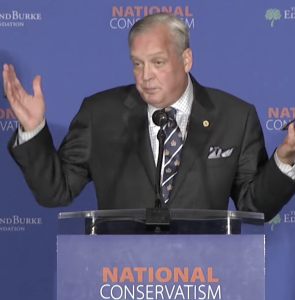 From that starting point, things will only get worse, he warned. “Once transcendence is denied, once God is denied, a host of alien doctrines establishes a new religion and a new public orthodoxy in various forms.” And in recent history, “that space has been filled by Marxism, communist ideology, critical theory, post-structuralism, identity politics, and woke activism, all driven by a religious passion and with ideas that invariably take on a religious shape.”
From that starting point, things will only get worse, he warned. “Once transcendence is denied, once God is denied, a host of alien doctrines establishes a new religion and a new public orthodoxy in various forms.” And in recent history, “that space has been filled by Marxism, communist ideology, critical theory, post-structuralism, identity politics, and woke activism, all driven by a religious passion and with ideas that invariably take on a religious shape.”
Christian nation
After condemning the European Union for leaving God out of their founding documents, Mohler made a case for America as a Christian nation.
I just want to make an argument. And that argument is that one of the great myths is that somehow the American constitutional tradition emerged out of a secularist impulse.”
He asserted that a “canopy of theological fixed meaning that was grounded in some form of Christianity explicitly when it comes to the American experiment, that that created the space whereby the two principles of the First Amendment — of free expression and no establishment of religion — could be adopted.”
The issue behind the First Amendment, he said, “was to avoid strife among Protestant sects.”
The issue behind the First Amendment, he said, “was to avoid strife among Protestant sects.”
Yet liberalism and modernity have pushed another narrative, he suggested. “We’re in a very different world now. And yet, it’s a world uninformed by history, either constitutional or political. It’s the assumption that somehow we have a secular state that just emerged virgin born.”
At the time of the nation’s founding, there were “varieties of Protestant Christianity with a smattering of deists,” he said. “They could afford to say no establishment of religion, something that I actually agree when it comes to the establishment of a state church, but, but there also is by extension the argument that there was no acknowledgement of religion whatsoever, which is just historically false.”
Mohler quoted political theorist Charles Taylor as saying that in the 1830s, the goal of the First Amendment was “to exclude all rivalry among Christian sects” and that “Christianity ought to receive encouragement from the state.” As evidence of this Mohler said by the 1890s, 37 of 42 state constitutions “recognize the authority of God” and “by 1892 the Supreme court would just simply say, ‘This is a Christian nation.’”
No salvation in Christian nation
One is not saved by being born into such a “Christian nation,” Mohler said, but the nation benefits from its Christian heritage.
“I believe the salvation comes to those who come to a personal knowledge and confession of Lord Jesus Christ and repent of their sins,” he said. “I do not believe you become a Christian by being born in a nation predominated by Christians, but I am thankful to live in a society that is the inheritance of a Judeo-Christian civilization, because it has established the very freedoms that we know. Where else do we have access to any stable notion of human dignity? Where else do we have any access to the notion and defense of human rights in any substantial form?”
He later added: “Unless human rights are grounded in the righteousness and justice of God, then they are nothing more than political fictions to be endlessly negotiated and renegotiated.”
“If there is to be a future for conservatism in the United States, it’s going to increasingly be a conservatism of strong theological arguments.”
The bottom line, he said, is this: “If there is to be a future for conservatism in the United States, it’s going to increasingly be a conservatism of strong theological arguments.”
People will be religious even when they say they are not, he asserted. “Religion is going to work its way out. … The new woke religion has its own liturgy. It has its own doctrines. It has its own catechesis. It has its own cathedrals. It has its own doctrine of sin, its own promise of salvation. It has its own notion of sanctification. It has its own written cannon of scriptures and slogans. It has its own crusading flags choirs. It has its own inquisition and holy office. It has its cherished dogma, and it enjoys the right of excommunication known more popularly as cancel culture.”
‘Pre-political’
To be a committed conservative is “to be committed to the pre-political,” he said. “Politics is important. … but at the end of the day, the pre-political is more important, more foundational than the political. The political is an extension of the pre-political. If you don’t believe that there is an institution before the state, then honestly you idolize the state. … We have to recognize a prior commitment to the pre-political realities of creation, order, marriage, family, community, nation.”
He concluded: “A conservative movement that does not conserve what it means for God to make human beings male and female in his image, that does not conserve marriage as the lifelong covenant union of a man and a woman, that does not define the natural family as the essential heart of human society, that does not protect life in the womb and life in the family, that does not acknowledge the theological roots of our political life as a nation, is by no means conservative and can never be.”
Related articles:
Mohler endorses Trump while Piper disses Trump and feels the backlash
The moral hypocrisy of Albert Mohler (and evangelicals of his ilk) | Opinion by Marv Knox
Mohler to speak on the ‘idolatry’ of secularism at conference advocating ‘national conservatism’

